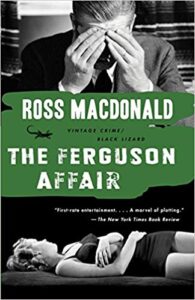THE FERGUSON AFFAIR — Part One

WHAT THE CRITICS SAY
“It is a flat and unengaging work, thematically diffuse and finally not quite credible. A story of fathers and daughters, husbands and wives, and the psychological tension and confusion of those playing dual roles, the novel obscures most of what it attempts to clarify . . . Although it has many good things in it, The Ferguson Affair is finally an uninspired performance by a writer who has done better and would do much better work.”
—-Bernard Schopen, The Novels of Ross Macdonald
“The Ferguson Affair reads like an apologia to the Santa Barbara sector most upset by Linda Millar’s accident and the court’s apparent refusal to ‘punish’ her. The book pleads forgiveness for the unintended sins of the young . . . So Millar wishes to be judged and have his daughter judged. A hospitalized Gunnarson almost religiously merges with the lower town’s ‘others’ when he receives a blood transfusion from a Hispanic cop.”
—– Tom Nolan, Ross Macdonald
“The Ferguson Affair attempts to control a widely divergent set of plot lines . . . Critic Peter Wolfe feels that ‘because the book has too much material, some of these things lack definition’ and finds the ending ‘clogged and contrived.’ But despite a lack of unity, the novel does contribute new insight into basic themes.”
— Jerry Spier, Ross Macdonald
“The Ferguson Affair was by and large a mild failure, a dead end. Macdonald’s experiment with a married detective never gels.”
— Michael Kreyling The Novels of Ross Macdonald
“Ferguson is a rich, robustly told novel that exerts force at several levels [yet] the domestic subplot doesn’t fuse with the main action. Some events occur out of view . . . the ending is clogged and contrived . . . Most of the way the structure is trim and smart. Though the novel ends badly, it has a strong start . . . The detective novel has more sinew and suppleness thanks to The Ferguson Affair.”
— Peter Wolfe, Dreamers Who Live Their Dreams
What the Public Thought
Despite the absence of Lew Archer the book sold well, with multiple hardcover printings and strong paperback sales. According to Nolan, The New York Times gave it a “rave review.” The sales rescued Macdonald from the financial disappointment of The Galton Case and The Doomsters and helped him retire some of Linda’s legal and medical bills.
Fun Facts
Macdonald considered Death Mask and The Silver Dollar Tree before settling on the final title choice. Alfred Knopf, whose well of bad advice was never emptied, suggested that Macdonald stop using Archer in light of the poor sales of the last two Archer books.
Recent Comments